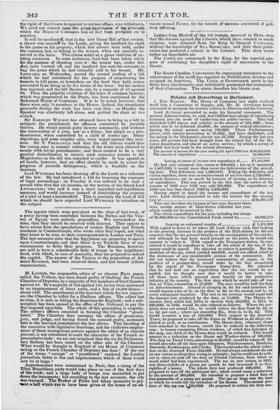M. LIONNE, the responsible editor of an obscure Paris paper,
called the Tribune, has been found guilty of libelling the French Chamber of Deputies, by a majority of 256 members of that Chamber against 50. By a majority of 204 against 103, he has been sentenced to an imprisonment of three years, and a fine of 10,000 francs— about 400/. The punishment is the heaviest which the law empow- ers the Chamber to inflict for a libellous offence. The editor lost no time, it is said, in taking his departure for England ; and a sub- scription has been opened at the office of the National, to pay the line imposed upon him. The whole of this proceeding is singular. The editor's offence consisted in terming the Chamber "prosti- tuted." The Chamber then assumes the offices of prosecutor, jury, and judge, and having found the accused guilty, sentences him to the heaviest punishment the law allows. This blending of the executive with legislative functions, and the vindictive employ- ment of these incongruous powers against the editor of an obscure journal, is not calculated to exalt the character of the French re- presentative body: we are not surprised that the cry for Parliamen- tary Reform has been raised on the other side of the Channel. What would be thought in England of our House of Commons acting as the French Chamber of Deputies has done ? If the use of the terms "corrupt" or "prostituted" rendered the London journalists liable to fine and imprisonment, which of them would now be at large ? Apprehensions were entertained in Paris, that a rising of the 'Ultra Republican party would take place on one of the first days of the week; and a large body of troops was assembled to put -down the insurgents; but according to the last accounts, the city was tranquil. The Prefect of Police had taken measures to pre- -went alma whichwas to have been given at the house of an ad- vocate named FENET, for the benefit of persons convicted of poli- tical offence,


















 Previous page
Previous page